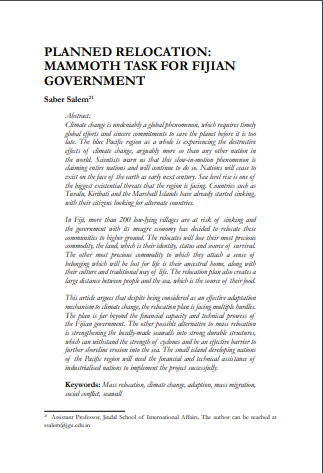Planned Relocation
Mammoth Task for Fijian Government
DOI:
https://doi.org/10.54945/jjpp.v5i1.155Abstract
Climate change is undeniably a global phenomenon, which requires timely global efforts and sincere commitments to save the planet before it is too late. The blue Pacific region as a whole is experiencing the destructive effects of climate change, arguably more so than any other nation in the world. Scientists warn us that this slow-in-motion phenomenon is claiming entire nations and will continue to do so. Nations will cease to exist on the face of the earth as early next century. Sea level rise is one of the biggest existential threats that the region is facing. Countries such as Tuvalu, Kiribati and the Marshall Islands have already started sinking, with their citizens looking for alternate countries.
In Fiji, more than 200 low-lying villages are at risk of sinking and the government with its meagre economy has decided to relocate these communities to higher ground. The relocates will lose their most precious commodity, the land, which is their identity, status and source of survival. The other most precious commodity to which they attach a sense of belonging which will be lost for life is their ancestral home, along with their culture and traditional way of life. The relocation plan also creates a large distance between people and the sea, which is the source of their food.
This article argues that despite being considered as an effective adaptation mechanism to climate change, the relocation plan is facing multiple hurdles. The plan is far beyond the financial capacity and technical prowess of the Fijian government. The other possible alternative to mass relocation is strengthening the locally-made seawalls into strong durable structures, which can withstand the strength of cyclones and be an effective barrier to further shoreline erosion into the sea. The small island developing nations of the Pacific region will need the financial and technical assistance of industrialised nations to implement the project successfully.







